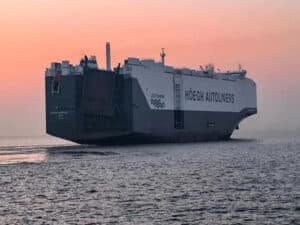
IMO: Transition to low-sulfur fuels “extremely smooth”
Written by Nick Blenkey
Image: IMO
The International Maritime Organization (IMO) reports that the reduction in the upper limit of the sulfur content of ships’ fuel oil to 0.5% (from 3.5%) that went into effect January 1, 2020, has significantly reduced air pollution from ships. And it says the so-called “IMO 2020” transition to low sulfur fuels has been “extremely smooth, a testament to the preparations of all stakeholders prior to the new rules entering into force.”
“Through 2020, just 55 cases of 0.50% compliant fuel being unavailable had been reported in IMO’s Global Integrated Shipping Information System (GISIS),” said Roel Hoenders, Head of Air Pollution and Energy Efficiency at IMO. “Given that more than 60,000 ships plied the world’s oceans in trade last year, this was a remarkably low percentage of ships encountering difficulty in obtaining compliant fuel. We had a great deal of preparation during 2019 and before, from all stakeholders and all indications are that there have been no significant issues with supply of low sulfur fuel oil.”
The majority of ships trading worldwide switched from using heavy fuel oil (HFO) to using VLSFO. Generally speaking, these are new blends of fuel oil, produced by refineries to meet the new limit, in accordance with IMO guidance and ISO standards.
SCRUBBERS
Alternately, ships can use exhaust gas cleaning systems, (“scrubbers’) to comply and IMO says that over 2,350 such systems have formally been reported to it as an approved “equivalent method” by flag states.
Another alternative is to use engines capable of burning alternate fuels with low or zero sulfur, such as LNG or biofuels, though IMO puts no number on how many ships are taking that approach.
Guidance issued by IMO on dealing with the new fuel blends in advance of the new requirement addressed implications of switching to VLSFO, including assessing and managing risks and highlighting potential safety risks, so that the risks can be mitigated.
Through 2020, and into 2021 to date, IMO has not received any reports of safety issues linked to VLSFO.
Nonetheless, during 2020, an IMO correspondence group considered fuel oil safety issues in general and the need for further mandatory requirements to ensure fuel oil supplied meets the required standards and quality. The report of the group (MSC 102/6) will be discussed at the next session of IMO’s Maritime Safety Committee (MSC), MSC 103 in May 2021.
Prior to that, the eighth session of the Sub-Committee on Prevention of Pollution from Ships (PPR 8), scheduled to meet remotely from March 22 to March 26, 2021, will further consider VLSFO fuel quality issues, including possible effects on black carbon emissions.




